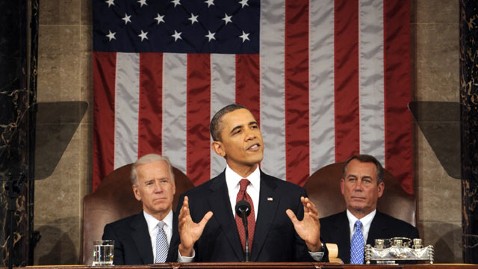Cultural Populism vs. Economic Populism

(Image Credit: Saul Loeb/AP)
Now that the president's State of the Union is behind us, we have a good indication of what kind of campaign he is going to run: economic populism. President Obama and his team have been signaling such a strategy for the past few months, but they put a fine point on it Tuesday night.
If you look at the speech Tuesday night and search for the thematic value on which he touched most, it was all about fairness and equity. Obama said "fair share," "unfair," "'play by the same rules," etc., a number of times throughout the speech. He has chosen to run as an economic populist in this election cycle, especially with Mitt Romney once considered the presumptive GOP nominee. The president will use the economy and tax rates and what the he sees as economic inequity to appeal to blue-collar workers and middle-class voters who will decide this election.
This raises another interesting point: The speech seems to have been mostly written a few weeks ago when the dynamics of the Republican nomination process were very different. It seems to be from a time when the White House thought Romney would be the inevitable nominee and that Newt Gingrich didn't have a chance. We all know today the race is much different with Gingrich riding a wave of momentum.
Gingrich's latest rise and appeal seem to be directly tied to his message touching the frustrations and concerns of blue-collar and middle-income voters in the Republican primaries. He, like the president, has chosen a populist approach to his campaign. But Gingrich's message seems to be one much more aligned with cultural populism than economic populism.
This cultural populism doesn't speak to income inequality and tax rate unfairness. It is much more about a forceful argument against cultural elites such as the media and Hollywood who, Gingrich says, are, at best, out of touch with true American values (including religion and faith) and, at worst, are undermining these values. It is a values-based argument much more about U.S. culture than about economic unfairness.
And, so, we have a president who has for now chosen to run as an economic populist against economic elites (as he sees Romney), and the rising candidacy of Gingrich, who is running as a cultural populist against cultural elites in this country. And both are attempting to appeal to the exact same group of voters: frustrated and disillusioned blue-collar and middle-class voters.
Gingrich's emerging as the Republican nominee would be a historic, never-before-held battle all around populism. A true clash of the Titans, economic populist vs. cultural populist. Wow.
Stay tuned and let's see how this develops after the Florida primary next week.